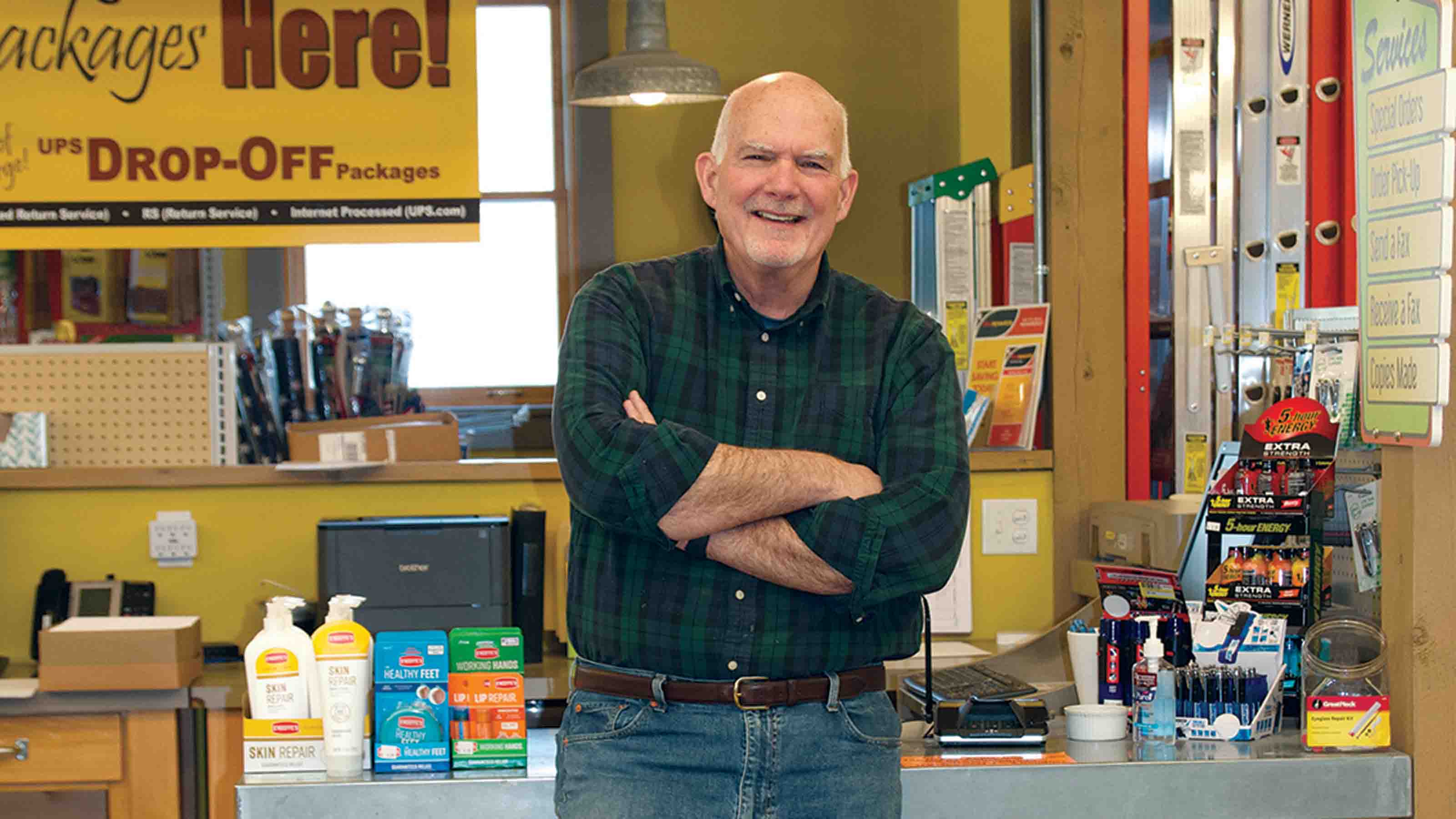A Store Where They Know Your Name
It can’t compete with big-box retailers on price, but customer service is the draw.


Profit and prosper with the best of Kiplinger's advice on investing, taxes, retirement, personal finance and much more. Delivered daily. Enter your email in the box and click Sign Me Up.
You are now subscribed
Your newsletter sign-up was successful
Want to add more newsletters?

Delivered daily
Kiplinger Today
Profit and prosper with the best of Kiplinger's advice on investing, taxes, retirement, personal finance and much more delivered daily. Smart money moves start here.

Sent five days a week
Kiplinger A Step Ahead
Get practical help to make better financial decisions in your everyday life, from spending to savings on top deals.

Delivered daily
Kiplinger Closing Bell
Get today's biggest financial and investing headlines delivered to your inbox every day the U.S. stock market is open.

Sent twice a week
Kiplinger Adviser Intel
Financial pros across the country share best practices and fresh tactics to preserve and grow your wealth.

Delivered weekly
Kiplinger Tax Tips
Trim your federal and state tax bills with practical tax-planning and tax-cutting strategies.

Sent twice a week
Kiplinger Retirement Tips
Your twice-a-week guide to planning and enjoying a financially secure and richly rewarding retirement

Sent bimonthly.
Kiplinger Adviser Angle
Insights for advisers, wealth managers and other financial professionals.

Sent twice a week
Kiplinger Investing Weekly
Your twice-a-week roundup of promising stocks, funds, companies and industries you should consider, ones you should avoid, and why.

Sent weekly for six weeks
Kiplinger Invest for Retirement
Your step-by-step six-part series on how to invest for retirement, from devising a successful strategy to exactly which investments to choose.
Who: Jeff Gietzen
What: Hardware store owner
Where: Glen Arbor, Mich.
From just $107.88 $24.99 for Kiplinger Personal Finance
Become a smarter, better informed investor. Subscribe from just $107.88 $24.99, plus get up to 4 Special Issues

Sign up for Kiplinger’s Free Newsletters
Profit and prosper with the best of expert advice on investing, taxes, retirement, personal finance and more - straight to your e-mail.
Profit and prosper with the best of expert advice - straight to your e-mail.
How long have you owned your store? My wife, Georgia, and I acquired our business, Northwoods Hardware, Home, Gift and Nursery, 11 years ago. Our background before that was 35 years in supermarkets, in the Grand Rapids/greater western Michigan area. The business was Georgia’s family’s business, started by her grandfather, and the family ended up selling it to the wholesaler. The hardware store here had been for sale for about a year and a half, and we ended up buying it and moving here.
Does your wife work for the business? Yes, Georgia does our home-goods and décor buying and merchandising. Full-time, we have about six people, and then in the summer we typically add another four to six people. Our daughter, Gillian, also works with us here at the hardware store.
Who are your clientele? A mix of year-round people, who are mostly retired, and some business owners, plus seasonal homeowners and a lot of tourists. In the summer, it’s a more upscale area. Glen Arbor is in Leelanau County, which is partly surrounded by Lake Michigan. There is a national park here called Sleeping Bear Dunes. People come from western Michigan, Chicago, St. Louis, Indianapolis, Cincinnati, Pittsburgh, Dayton, Detroit. A lot of people venture north for the summer. Our customers are also the contractors who end up taking care of the homes and condominiums that need work.
How has the pandemic affected business? There was a period in spring 2020 when we shut the doors, but we did curbside sales and delivery. Once we all started to understand the virus, we opened the hardware store back up, but we required masks, did multiple daily cleanings and posted a sign for social distancing. We did apply for the first round of PPP loans and were awarded that as an offset to what initially was a lack of sales. But ironically, if we look at the first year of COVID, our sales ended up rather substantially because many of the people that have second homes here relocated here. Everybody started to get bored, so they wanted projects to do.
How has the supply-chain disruption impacted your business? Initially, there wasn’t really too much of an impact. But we were affected as businesses started to reopen—especially some of those businesses with manufacturers that had shut down and had a hard time getting their plants back online quickly. Then a lot of products were held up—and probably are still held up, in some cases. We are starting to slowly see some areas improve, and our wholesaler continues to do a good job of sharing the status of the suppliers and the supply chain. But prices have gone up significantly. Metal products and paint are categories where there have been a lot of price increases.
What products have been most disrupted by supply-chain issues? Anything metal-related or plastic-related. Normally, we would get most of our grills for the upcoming summer season in December, but there’s a good portion that we have not yet received, and probably won’t until March or April.
You’re expanding your store. Business must be good. We are a small hardware store, so we’re not going to be able to compete on price with the big-box stores. Our strength is customer service and attention to detail. Also, we’re very involved in the community, helping others and nonprofits. We try to greet every customer who comes in the store. Many of them I know by name. We really have tried to go above and beyond in our commitment to customers.
Profit and prosper with the best of Kiplinger's advice on investing, taxes, retirement, personal finance and much more. Delivered daily. Enter your email in the box and click Sign Me Up.

Emma Patch joined Kiplinger in 2020. She previously interned for Kiplinger's Retirement Report and before that, for a boutique investment firm in New York City. She served as editor-at-large and features editor for Middlebury College's student newspaper, The Campus. She specializes in travel, student debt and a number of other personal finance topics. Born in London, Emma grew up in Connecticut and now lives in Washington, D.C.
-
 5 Vince Lombardi Quotes Retirees Should Live By
5 Vince Lombardi Quotes Retirees Should Live ByThe iconic football coach's philosophy can help retirees win at the game of life.
-
 The $200,000 Olympic 'Pension' is a Retirement Game-Changer for Team USA
The $200,000 Olympic 'Pension' is a Retirement Game-Changer for Team USAThe donation by financier Ross Stevens is meant to be a "retirement program" for Team USA Olympic and Paralympic athletes.
-
 10 Cheapest Places to Live in Colorado
10 Cheapest Places to Live in ColoradoProperty Tax Looking for a cozy cabin near the slopes? These Colorado counties combine reasonable house prices with the state's lowest property tax bills.
-
 How to Search For Foreclosures Near You: Best Websites for Listings
How to Search For Foreclosures Near You: Best Websites for ListingsMaking Your Money Last Searching for a foreclosed home? These top-rated foreclosure websites — including free, paid and government options — can help you find listings near you.
-
 Four Tips for Renting Out Your Home on Airbnb
Four Tips for Renting Out Your Home on Airbnbreal estate Here's what you should know before listing your home on Airbnb.
-
 Is Relief from Shipping Woes Finally in Sight?
Is Relief from Shipping Woes Finally in Sight?business After years of supply chain snags, freight shipping is finally returning to something more like normal.
-
 Economic Pain at a Food Pantry
Economic Pain at a Food Pantrypersonal finance The manager of this Boston-area nonprofit has had to scramble to find affordable food.
-
 The Golden Age of Cinema Endures
The Golden Age of Cinema Enduressmall business About as old as talkies, the Music Box Theater has had to find new ways to attract movie lovers.
-
 Pricey Gas Derails This Uber Driver
Pricey Gas Derails This Uber Driversmall business With rising gas prices, one Uber driver struggles to maintain his livelihood.
-
 Smart Strategies for Couples Who Run a Business Together
Smart Strategies for Couples Who Run a Business TogetherFinancial Planning Starting an enterprise with a spouse requires balancing two partnerships: the marriage and the business. And the stakes are never higher.
-
 Fair Deals in a Tough Market
Fair Deals in a Tough Marketsmall business When you live and work in a small town, it’s not all about profit.